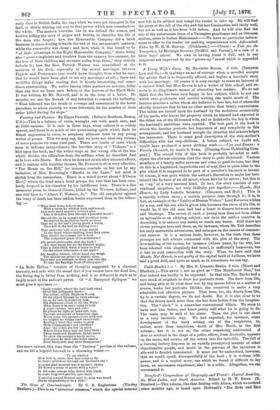Fantasy and Passion. By Edgar Fawcett. (Roberts Brothers, Boston, U.S.)—This
is a volume of verse, wrought out with much care, and no little success. It is rash in these days, when culture is so widely spread, and there is so much of the questioning spirit which finds its fittest expression in verse, to prophesy ultimate fame to any young writer of poems. This we may say, that we have not seen any volume of more promise for some time past. There are faults of taste which seem to indicate inexperience ; the horrible story of " Tiolante" is a blot upon the book, and the writer steps on the wrong side of the line which divides the ridiculous from the sublime when he describes Jael as in love with Sisera. But when he does not strain after unusual effects, and is content with humbler themes, Mr. Fawcett is often very effective. "The House on the Hill," for instance, reminds us, but not by any imitation, of Mrs. Browning's "Bertha in the Lane ;" nor need it shrink from the comparison. There is a weird power about " D'Outre Mort," where the dead man's hand grasps the rose that has been care- lessly dropped in his chamber by his indifferent love. There is a fine memorial poem to General Custer, killed by the Western Indians, and one still finer to "Albert F. Webster, Jr." The old complaint against the irony of death has been seldom better expressed than in the follow- ing :—
"What fatal irony follows man With a curse no wisdom bath understood. And reels amid nature's ordered plan Like a drunken faun through a peaceful wood ?
Should life, in its meagre and troublous term,
Be marred by mockeries harsh as those That set in the leafs young green a worm,
That kill in the bud its waiting rose?
That smite the lark as its wings unfold In the dawn whose thrilling dews they crave, That shatter the column ere it hold The sculptured grace of its architrave?
Ah, proud philosophy, shut thy book ?
Art thou better for all thy boasted might, Than a little child, when it turns its look
On the silver labyrinths of the night ?
Ah, haughty science, whose hand can weigh The monstrous planet in mighty skies, Thou bast not strength in thine arm this day To tear the bandage from off thine eyes!"
"La Belle Helene" consists of thoughts suggested by a classical travesty, and ends with the moral that if you cannot have the dead lion, the living dog is better than nothing, and is so different in style as to imply much of the author's power. Of "A Barnyard Epilogue" we must give a specimen :—
"Look yonder, where the lord doth stand Of all this polygamic land.— The sultan, caliph, Brigham Young Of the abject throngs he rules among; Or, as we call, in homelier talk, His Highness—Cock of All the Walk! What boots it in one's veins to hold A royal current, rare and old— Be prince by right of head-tuft, legs. Through ancestries of blameless eggs, When some vile upstart crows with zeal On heights no vulgar claw should feel; Bearing a head that seems to glow With Communism's red overflow ? Alas! the tribes are few on earth Where brute force may not level birth! These feathered Bourbons do but serve To show the usurper's hardy nerve, And prove by their own bitter smarts Even barnyards may have Bonapartes!"
One more extract, this time from the " Fantasy " portion of the volume, and we bid a hopeful farewell to a charming writer:—
" To AN ORIOLE.
How falls it, oriole, thou haat come to fly
In tropic splendour through our Northern sky ?
At some glad moment was it nature's choice To dower a scrap of sunset with a voice?
Or did some orange tulip, flaked with black, In some forgotten garden, ages back, Yearning toward Heaven until its wish was heard, Desire unspeakably to be & bird?"


































 Previous page
Previous page